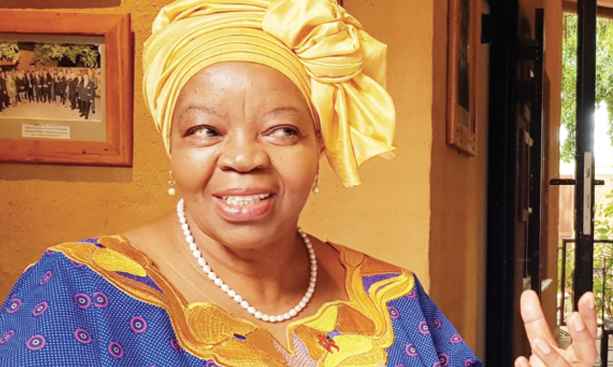As an academic, a civil society activist, an international servant and politician all wrapped into one, Professor Sheila Tlou shows no signs of slowing down her passion for health and gender empowerment, particularly its future both locally and internationally. THATO CHUMA reports
Globally the healthcare industry is going through massive disruption, and Botswana has not been spared. In the interest of
this shift, the healthcare system faced an overwhelming probability – to deal with an increase in Covid-19 cases, and even deaths.
A notable and powerful voice in healthcare space, Professor Sheila Tlou, is advocating for real change that will trickle down to the grassroots and empower health workers’ conditions and
roles.
Tlou has been aptly named a giant in Africa’s AIDS response due to the crucial role she played through as the Minister of Health, and to those she is closest to, she is simply ‘Kwete Shegal’. As we talked about the current state of Botswana’s health industry, her
views also highlighted a future that will demand courageous change in order to drive a positive influence, and more importantly, a new outlook towards health professionals. During her term as Minister of Health, Tlou contributed to the improvement of global health care, especially for women and girls. She led a comprehensive HIV/ AIDS prevention, treatment, care and
support programme in Botswana. With regards to how Botswana responded to this current global epidemic, Tlou notes
that there’s room for more.
HAILS COVID 19 RESPONSE STRATEGY
“Regarding our response to Covid-19 as a country, I have to compare Botswana to other countries and I am quite pleased and happy. So far, they have carried the task well, with just over 1000 positive cases currently, and nine deaths. In comparison to other
countries, we have done relatively well. The part I feel could be improved is the lack of community involvement that has transpired – the Taskforce Team has been too technical. Community health workers should be spearheading the response at the grassroots level as they better understand the behaviours of people and how best to mitigate them,” she declares. Staff shortages are affecting the implementation of health policies, explains Tlou.
“We actually have good health infrastructure in Botswana. The kind
of communication channels we create between health personnel and various ministerial bodies is what needs to be worked on to ensure that their concerns are taken seriously. Many of our
personnel fear for their lives, and they fear infecting their loved ones. Those fears were not thoroughly addressed.
Furthermore, we need massive training of health personnel in all cadres to effectively use the health facilities we have. Expanding the training of the involvement of nurses. Nothing can happen without nurses, and Covid-19 has made that apparent, although
while Minister of Health, I had the same outlook. They really deserve to be appreciated. We must become a more appreciative society. In other countries such as Kenya, every evening around trainers is also paramount. Primary healthcare is all about communities leading change for and by communities.”
TREAT HEALTH STAFF BETTER
She describes nurses as the backbone of the healthy system, highlighting how their involvement must always be central in national responses. “It is important for nurses and doctors to work in a safe environment physically, emotionally and mentally. One thing that is clear is that you cannot reach universal health coverage without the 8pm, they beat drums and play music to celebrate their health workers, but in Botswana, we don’t do anything for them. This needs to change.” The future of health in Botswana is bright according to Tlou, even though there are signs of strain as evident in the high infant mortality rate that has
jumped from 27% per thousand now to almost double that percentage. “The training of health practitioners has gone down the past decade. We should be having theatre nurses, nephrology nurses and many others where there is a gap. We should be
having family welfare educators who are on the grassroots and teaching communities about this pandemic, for example.
Nothing can be successful without the involvement of the community. The future is bright provided that we now sit down and concentrate on the training of all cadres of health personnel. We must channel funds and resources to the right things.” Tlou added that research must also be central in the health industry: “There
needs to be an engagement of scientists and researchers in solving our own health problems. In the face of Covid-19,
it would have been expected for there to be a research fund that supports local researchers to be able to join others around the world in the quest for a vaccine or even a cure.
We will have more epidemics following Covid-19. Botswana has the potential to be known as a health problem solver, and it is high time our researchers can participate in those findings. In that way
we will not only be contributing to the health of Batswana but also to those of Africans and globally,” she says.
A HEAVYWEIGHT
Prof. Tlou is currently Co-Chair of the Nursing Now Global Campaign, which aims to raise the status and profile of nursing. Run in collaboration with the World Health Organisation and the
International Council of Nurses, Nursing Now seeks to empower nurses to take their place at the heart of tackling 21st Century health challenges. The campaign runs until the end of 2020 and aims to improve perceptions of nurses, enhance their influence and
maximise their contributions to ensuring that everyone everywhere has access to health and healthcare.
She is also Co-Chair of the Global HIV Prevention Coalition, initiated by UNAIDS and UNFPA and borne out of the need to address the gap and rise in new infections despite success in treatment and care in all countries across the world. Countries have committed to reducing new HIV infections to fewer than 500 000 annually by 2020 and ending AIDS as a public health threat by 2030.
